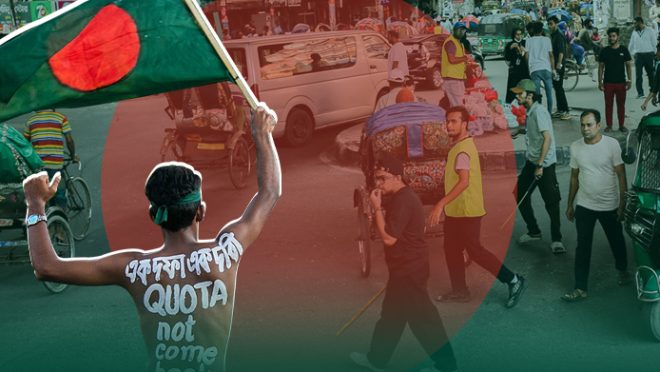Quota reform to mass uprising: Road towards an equitable society
Quota reform to mass uprising: Road towards an equitable society

Bangladesh has a rich history of rebellion and revolution, added to that are the recent protests that started with the demand for reformation of a discriminatory quota policy in government jobs and eventually shaped into a mass uprising against the lack of democracy.
Led by the students, this revolution is a testament to the fact that our youth possess a spine of steel and are always ready to fight injustice.
Many of them have embraced martyrdom, while others tolerated oppression and lost their loved ones, giving a renewed independence to our dear motherland.
This victory is undoubtedly a historic one, but the responsibility to rebuild our nation from the ruins and restore peace still lie on our shoulders.
Ahallya Padmoja Shreya, an economics major at the University of Dhaka says, “It’s hard to believe how a seismic shift has happened in just three weeks. I’ve protested and been active on social media about the issue, but it’s quite surreal that we managed to overthrow an autocratic regime. However, the victory did come at a cost of hundreds of lives.
“To honour their sacrifices, we must consider the concerns of our minority communities and prevent the horrific acts of violence around the country. After all, the movement started with a common goal and strong message against systematic discrimination.”
Rezwan Ahmed Refat, an active coordinator of the movement and a law student at the University of Dhaka states, “This is only the first step. We still have miles to go in reforming our country, society, and people. Bangladesh is at a crossroads and it is on the youth to strengthen our institutions, reform our policies, and ensure our rights.”
An ineludible aspect of sustaining a non-discriminatory society is ensuring the minorities’ rights to social security. In the face of this dynamic and sudden shift, the minority communities in our country, who are an inseparable part of the nation, are facing acute challenges.
Abul Bashar Rahman, a major in International Economics at the University of British Columbia, says, “What we witnessed over the past three weeks is the culmination of decades of pent-up emotions of an entire nation. For the first time, I feel liberated and it’s an incredible feeling. However, I know the real work has just begun.
The systematic failures of the past governments have left our country extremely vulnerable, particularly for minorities, people of different faiths, and those in the CHT. Each of us has a role to play in rebuilding and addressing these injustices. While we can choose to be either optimistic or pessimistic about the future, I choose to believe in the bright future that lies ahead for Bangladesh.”
Liton Tripura, currently studying Economics at the University of Dhaka also talked about the rights of the ethnic minorities, his own people, “The fall of the fascist government and the mass uprising is as valued by the ethnic minoroty as by the majority. Transition periods of governments always disrupt the regular order of the society but the anarchy happens to be worse for the ethnic minorities.
He demanded the full implementation of the CHT peace accord. “This would make way for our right to equally participate in the governing body of a country that is our own. Just an Indigenous quota isn’t enough for us to contribute to the progress of the country,” he added.
“Unfortunately, the interim Indigenous representative’s past loyalty to the fallen fascist regime and inadequate efforts to protect our rights concerns us. We expect our representative to be vocal about our rights and live up to the expectations of the community,” he added.
Tathira Baatul, a Marketing major at Bangladesh University of Professionals sheds light on a Muslim Community, “Sufism is a cornerstone of Bangladeshi society, with 26% of Muslims following Sufi practices.
“However, the society has been increasingly under attack. A new government must prioritise safeguarding religious minorities and fostering a climate of inclusivity. Concrete steps should include enacting stringent anti-violence laws, providing adequate security for Sufi shrines, and promoting interfaith dialogue to counter extremist narratives.”
A very effective way to address communal violence and increase unity is reflecting on these issues through academics and inclusion in textbooks.
Ahona Sagor Sana, another economics major at the University of Dhaka suggested a few ways to counter communal violence, “As the first step, use of any derogatory term used for Bangladeshi Hindus must be stopped. Chapters promoting communal harmony have to be included in the curriculum from grades one to ten, particularly in Bangla and Bangladesh and Global Studies Books. Minority rights have to be secured legally.
Every form of violence against minorities needs to be stopped and the perpetrators should be punished accordingly. This country has been liberated by the people of all religions, and thus a secular state has to be ensured.”
The virtue of independence lies in the security of life for every section of society.
As we rejoice in this new beginning and anticipate a better future, we must also remember that our victory will not serve its complete purpose unless we can make Bangladesh a safe abode for minorities and eradicate their need to migrate to other countries seeking safety. After all, none of us are free unless all of us are free.


